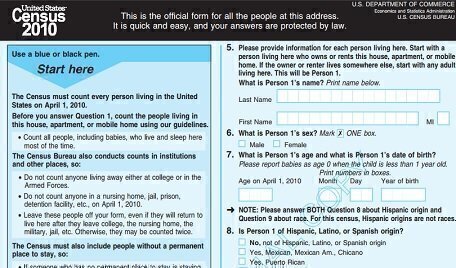Late next month, Congress will get a proposed list of 2020 Census questions that could set off another lawsuit about voting rights and congressional apportionment.
 On Monday, California state attorney general Xavier Becerra and officials from 18 other states sent a letter to Commerce Secretary Wilbur Ross threatening a lawsuit if the Census Bureau includes a question about citizenship on its main 2020 Census form.
On Monday, California state attorney general Xavier Becerra and officials from 18 other states sent a letter to Commerce Secretary Wilbur Ross threatening a lawsuit if the Census Bureau includes a question about citizenship on its main 2020 Census form.
Becerra and the group said a late 2017 Justice Department request to add the question to the main 2020 Census created several constitutional problems. However, the Justice Department’s request to Ross also claimed the citizenship question solves a critical flaw in determining Voting Rights Act violations.
The media service ProPublica first reported the Justice Department request to the Census Bureau. In a letter from General Counsel Arthur E. Gary, the Department said the citizenship question was “critical to the department’s enforcement of Section 2 of the Voting Rights Act and its important protections against racial discrimination in voting.” Gary explained that better data on the citizen voting-age population was needed to meet Section 2’s requirement that minority voter participation wasn’t diluted in election districts.
In 2010, the citizenship question wasn’t included the full Census. Instead, the annual, detailed American Community Survey, which goes to about 2.5 percent of the U.S. households, asks about citizenship. The Justice Department now believes the error rate is too high in that annual survey and the differences in sampling groups between the annual ACS and the decennial Census are too great for it to fairly decide Section 2 claims, along with redistricting claims.
Becerra and his group believe something else: The question’s nature could lead to large immigrant groups being underrepresented in the Census. This causes several practical and constitutional problems, Becerra claims.
“The U.S. Constitution requires ‘counting the whole number of persons in each State.’ Adding a citizenship question would fatally undermine the accuracy of the 2020 Census and reduce response rates, especially among immigrant and noncitizen communities,” Becerra said in the letter. He also argued that the lateness of the request is impractical; states could lose representatives in Congress and federal funding due to a wrong Census tally; and that the request actually makes it harder to enforce Section 2 of the Voting Rights Act.
And it’s very clear that California will take the issue to federal court if the citizenship question is approved for the 2020 Census. “The California Department of Justice is putting President Trump on notice: if a citizenship question is added to the 2020 U.S. Census Bureau questionnaire, we are prepared to take any and all necessary legal action to protect a full and accurate Census,” Becerra said.
Law professor Nathaniel Persily identified some of these issues in a 2011 law review article for the Cardozo Law Review. “This lack of national citizenship data on a par with census population data presents several quandaries for voting rights law,” Persily said. One issue is that incomparable data could lead to problems when it comes to determining if Section 2 violations in cases based on the number of persons or voters in a district.
The question of whether a state can be required to use total population or total citizens to design legislative districts was settled in 2015 by the Supreme Court. In a majority opinion in Evenwel v. Abbott, Justice Ruth Bader Ginsburg said that a state couldn’t be barred from using total population to determine a voting district. But the Court also acknowledged that a 1966 decision, Burns v. Richardson, permitted states also to use registered voters who were citizens to determine a legislative district.
Scott Bomboy is the editor in chief of the National Constitution Center.







